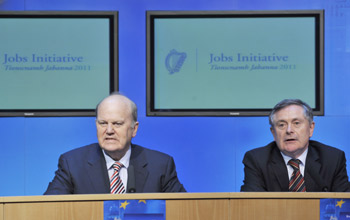Why the “Jobs Initiative” won’t work

The government's “Jobs Initiative” is likely to prove a serious disappointment due to a failure to reduce welfare rates and reversing the minimum wage cut
20 May 2011
 When the government announced its “Jobs Initiative” earlier this month most attention focused on the controversial move to fund the package by raiding private sector pension funds. For each of the next four years private pension funds will pay a levy equivalent to 0.6% of gross assets under management. The government estimates that this will raise €470m a year and €1.9bn over four years.
When the government announced its “Jobs Initiative” earlier this month most attention focused on the controversial move to fund the package by raiding private sector pension funds. For each of the next four years private pension funds will pay a levy equivalent to 0.6% of gross assets under management. The government estimates that this will raise €470m a year and €1.9bn over four years.
The pension fund levy flies in the face of previous government policy to encourage private sector workers, of whom only just over 50% belong to any sort of pension plan, to save more for their retirements.
With pension fund returns having failed to beat inflation over the past decade, a levy, which will further erode returns, will make it even more difficult to persuade private sector workers to save for their old age. This will mean that even more of them will end up relying exclusively on the state pension. With the number of over-65s set to almost treble over the next half-century this is piling even more pressure on the exchequer.
Immoral and counter productive
Not to put too fine a point on it, the pension fund levy is yet another demonstration of the absence of joined-up government which has contributed so mightily to the Irish economic crisis. Not alone is the pension levy immoral, it is also politically incoherent and will almost certainly prove to be economically counter-productive.
Unfortunately the pension fund levy is the least of the problems with the jobs initiative.
One of the few positive moves, admittedly one which was imposed by the EU/ECB/IMF troika, made by the previous government was to cut Ireland’s minimum wage, which at €8.65 per hour is the second-highest in Europe, by €1 an hour. The cut in the minimum wage was strongly condemned at the time by Fine Gael and Labour, both of whom promised to restore it to its previous level when they returned to government.
A promise made in opposition is one thing. Delivering on it when in government is quite another. Given the gravity of our current crisis, no-one would have held it against the current government if the promise to reverse the cut in the minimum wage had been quietly forgotten.
After all the UK minimum wage is just £5.93 per hour, the equivalent of just €6.76 at the current exchange rate, while Germany, the EU’s largest and most prosperous economy manages just fine without any minimum wage whatsoever. However, the new government, in an act of stunning economic illiteracy chose to honour its promise on the minimum wage and raise it to €8.65 per hour once again. Some “Jobs Initiative”.
The JLC issue
And it’s not just an excessively-high minimum wage. The Irish labour market is also encrusted with the so-called Joint Labour Agreements, which set even higher, legally-binding wage rates for individual sectors.
And what has the “jobs initiative” got to say about these barriers to employment creation? It promises to publish the report, The Independent Review of Employment Regulation Orders and Registered Employment Agreements “shortly”.
Following the publication of the report, the government is pledged to unspecified “substantial reform” of the Joint Labour Agreements system. Which could of course mean anything: or far more likely, absolutely nothing.
Our ‘mad’ welfare system
Unfortunately, bad and all as the excessive wage rates made possible by the minimum wage and Joint Labour Agreements are, the problems they create pale into insignificance by comparison with those resulting from our ridiculously generous welfare system.
Even after the reductions imposed in each of the last two budgets, the basic Irish weekly social welfare rate is still €188 per week. By comparison the same payment in the UK is just £67, the equivalent of e76 at the current exchange rate, and a mere €83 per week in Germany.
The fact that a bankrupt country, utterly dependent on the reluctant charity of its neighbours to pay its bills, still insists on paying welfare rates more than twice as high as those prevailing in its two main international competitors is mad, utterly mad.
Don’t rock the boat
So what does the “Jobs Initiative” have to say about our impossibly generous, creditor-funded, welfare system and its devastating impact on the labour market? Apart from some limp-wristed guff about “increasing levels of engagement with the unemployed”, yes, you’ve guessed it, absolutely nothing.
Which of course makes one seriously question the credibility of the entire exercise. This isn’t about reducing the number of unemployed but about a new government being seen to “do something”.
Of course the fact that Irish public sector workers, including ministers, TDs and senior civil servants, are still hugely over-paid by comparison with their counterparts in most European countries deosn’t help matters. After all who wants to bite the hand that feeds so generously? Far better to raid the old age savings of private sector workers.
Unfortunately we still don’t seem to get it. This government still imagines that it can somehow muddle through and that things will eventually sort themselves out before the next general election in 2016. Not without major and painful reforms they won’t.
With the entire Irish political and administrative system still in deep denial about the true extent of our problems, the likelihood is that the EU and the IMF will lose patience with us and that the much-needed reforms will be imposed upon us from outside.



 Print
Print






Fans 0
Followers